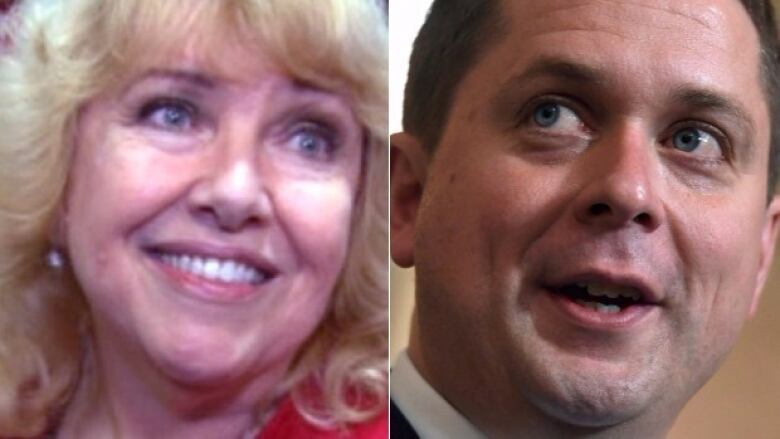Andrew Scheer 'condemns' Lynn Beyak's take on First Nations issues, but leaves her in caucus
'I certainly don't agree with her sentiments, she doesn't speak for our caucus, our party,' Scheer says

Conservative Leader Andrew Scheer says Sen. Lynn Beyak's recent remarks about First Nations people went a step too far, but he won't remove her from the Tory fold just yet.
"I certainly don't agree with her sentiments, she doesn't speak for our caucus, our party. I certainly condemn the choice of words that she used," Scheer said in an interview with CBC News Network's Power & Politics Monday.
Scheer said the northwestern Ontario senator has "no role" in the caucus.
As of late Monday, Beyak is still a Conservative member on three Senate committees, including transport, agriculture and defence. A spokesperson for Conservative Senate leader Larry Smith did not answer when asked if she would remain on those committees moving forward.
However, Scheer opened the door for Beyak to step aside from the party if she cannot commit to embracing a "positive, inclusive message" that he wants to share with Canadians.
"If they don't share in that vision, then they have a choice to make," he said.
When asked about his appeal among Indigenous peoples given his response to Beyak, Scheer said Conservative policies appeal to all Canadians.
"We want them to be partners in prosperity, we want them to share in the economic benefits of some of the natural resources projects that are available," he said, noting some First Nations peoples have supported pipeline development like Enbridge's now-defunct Northern Gateway and TransCanada's Energy East.
- Sen. Lynn Beyak's position in question after latest remarks about First Nations
- Conservatives take 'steps' to address Beyak's role after new comments on Indigenous rights
Beyak recently said she thought First Nations should give up their status cards, pursue a negotiated settlement to put an end to treaty agreements and become Canadian citizens. (Indigenous people born in this country are citizens.)
"None of us are leaving, so let's stop the guilt and blame and find a way to live together and share," she wrote in an open letter posted to her website. "All Canadians are then free to preserve their cultures in their own communities, on their own time, with their own dime."
Beyak has also defended the legacy of the residential school system, while criticizing the Truth and Reconciliation Commission (TRC) that conducted an exhaustive six-year study of the institutions.
"A small number of Aboriginals found the schools bad," she wrote in the open letter. "Only 1 in 3 Indigenous children ever attended them. Very few were torn from their parents arms, but rather were enrolled by loving parents who were away trapping and trading for months on end."
'Stupid' and 'erroneous'
Beyak's comments sparked outrage from at least one Conservative caucus colleague.
In an interview with CBC North Monday, Nunavut Sen. Dennis Patterson said her comments are "stupid" and "erroneous."
He said of course Indigenous peoples are citizens, and much more than a third of Inuit peoples forcibly attended residential schools throughout the north.

"This isn't the first time Sen. Beyak has shot her mouth off indiscriminately, and I'm very upset that her remarks have reflected on the Senate and on our caucus. Her remarks are provocative, offensive and they're misinformed. They're not based on fact," he said.
Patterson said her views are "way off the mainstream" and that he didn't know any senator who shares those views.
"Most of them that I've spoken to, and I'm sure all of them, are embarrassed and outraged by these comments she continues to make publicly," he said.
In a statement addressed to CBC News, and sent to the parliamentary press gallery, Beyak said last week that she believes all survivors of the residential school system should be compensated.
"I continue to advocate for them often and wonder what is taking so long. As stated in my letter, the dollars are going to lawyers and red tape obstacles instead of the deserving individuals," she wrote.
However, in 2007, the former Conservative government did reach the Indian Residential Schools Settlement Agreement (IRSSA) with some 80,000 former students.
As of September 2017, more than $3.1 billion has been paid to former students.
According to the Indian Residential Schools Adjudication Secretariat, 98 per cent of all claims have been resolved.


